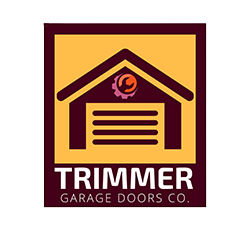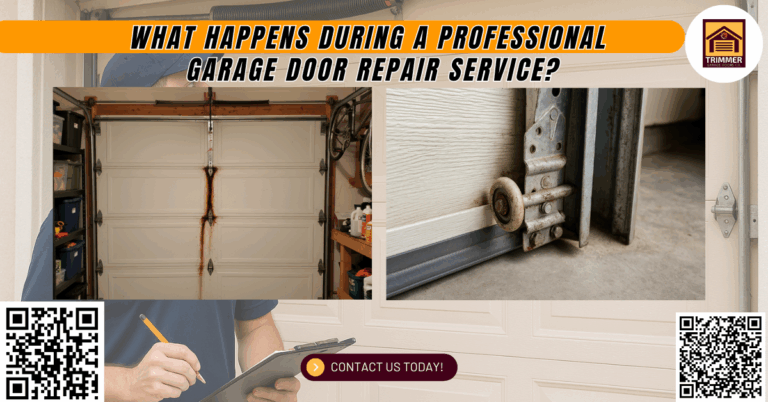If you’ve ever been jolted awake by a garage door groaning like an old freight train, you’re not alone. A recent call we received from a homeowner in Killeen, TX, led us to a midnight diagnosis of severely frayed garage door cables, causing screeching metal-on-metal noises. The homeowner thought it was a break-in, it was a breakdown. Garage door parts like cables and springs wear over time, but many people overlook them until the noise becomes unbearable.
According to the International Door Association, more than 70% of garage door noise complaints are tied to mechanical wear, often in components like rollers, hinges, or garage door cables. In Texas, especially around Killeen, where fluctuating humidity and frequent garage use are common, these problems tend to accelerate. At Trimmer Garage Doors Co., we’ve helped countless homeowners address these noise issues through comprehensive garage door services, particularly by replacing worn cables, springs, and other essential parts.
The big question many homeowners ask us: Can garage door cable replacement fix a noisy garage door? Yes, it absolutely can, especially when the noise is caused by imbalanced systems or fraying cables. But to understand why, we have to take a deeper look at how garage door systems function and how each component contributes to smooth, quiet operation.
What Do Garage Door Cables Do?
Garage door cables are essential components in the lifting mechanism of both residential and commercial garage doors. These cables, typically crafted from high-strength metal wire, work in tandem with torsion springs or extension springs to raise and lower the garage door with precision.
When engineered and installed correctly, garage door cables ensure that the door opens evenly, reduce stress on the opener, and distribute weight properly across the door. Without them, the entire door system becomes a liability. Cables run on drums mounted at the ends of the torsion shaft, winding and unwinding as the springs apply torque. When fabricated properly using quality machining processes and durable metal components, these cables can last for years.
Garage door cables come in different lengths and thicknesses depending on the size, weight, and type of garage door. In precision engineering, custom fabrication is sometimes required to ensure the cables meet exact tolerances. This is especially true in commercial doors or heavy-duty custom designs. Faulty cables don’t just make noise, they can render a garage door inoperable or even dangerous.
But over time, daily cycles take their toll. The constant up-and-down motion, combined with environmental factors like humidity, dust, or poor garage door maintenance, causes the cables to wear. Inadequate lubrication, poor alignment, or improper tension can all shorten their lifespan.
Common Causes of Garage Door Noise
Many noisy garage doors suffer from more than one issue. Here are the most common problems we see in our service shop:
1. Worn or Frayed Garage Door Cables
When cables start to fray, strands break loose and drag against metal parts. This creates a grinding sound and can cause the garage door to jerk or operate unevenly. These worn cables not only cause noise but also represent a serious safety hazard. If not replaced promptly, they can snap and cause extensive damage to other garage door components.
2. Failing Door Springs
Both torsion springs and extension springs support the door’s weight. If they weaken, more pressure is placed on other garage door parts, especially the cables. This imbalance leads to squeaks, pops, and jolts during operation. Springs that lose tension can also cause misalignment, making the entire door system noisy and less efficient.
3. Deteriorated Rollers and Hinges
Garage door rollers, especially steel ones, can become noisy if they’re not lubricated regularly. Nylon rollers offer quieter operation but need to be replaced periodically. Hinges that are rusted or worn out also contribute to clattering or creaking noises. These components are crucial to smooth operation and must be kept in optimal condition.
4. Misaligned or Worn Tracks
Garage door tracks can become bent or misaligned, especially after an accidental impact. When the door is forced to move along an uneven track, the rollers drag, the motor strains, and the result is a noisy garage door. Additionally, any foreign debris in the track can create loud scraping or banging noises during movement.
5. Poor-Quality or Aging Garage Door Openers
Chain-drive openers are common in older homes but tend to be louder than belt-drive systems. Over time, worn gears or misaligned motors within the opener can contribute to loud, inconsistent operation. Newer openers are designed for energy efficiency, quieter performance, and compatibility with smart home systems, making them ideal replacements for outdated models.
How Replacing Garage Door Cables Helps Reduce Noise
Restoring Tension Balance
Replacing garage door cables restores the correct tension throughout the door system. When tension is balanced correctly between the springs and the cables, the door moves smoothly and quietly. This balance reduces strain on the garage door opener and prevents jerky motion that often causes noise. Proper tension also extends the lifespan of all related components.
Eliminating Grinding and Rattling
Frayed or loose cables can drag across other metal components like the track brackets, drums, or hinges. Replacing these cables with new, precision-fabricated parts eliminates the source of the scraping and grinding sounds. New cables glide smoothly across CNC-machined drums and pulley systems, eliminating friction-related noise.
Protecting Other Components
Garage door systems are interconnected. When one part fails, others are affected. New cables reduce the load on torsion springs, garage door openers, and rollers, improving energy efficiency and reducing wear. This holistic improvement results in quieter overall operation and fewer future repairs.
Additional Parts That May Need Replacement
While cable replacement is often effective, we frequently advise homeowners to consider a full garage door maintenance check. Here are other garage door parts we commonly inspect:
- Garage Door Rollers: Swapping out steel rollers for high-quality nylon or ball-bearing options reduces operational noise.
- Torsion and Extension Springs: Replacing fatigued springs helps restore smooth, quiet function.
- Garage Door Hinges: Upgrading to commercial-grade hinges prevents rattling.
- Garage Door Openers: Installing a modern opener with compliant controls, such as a smart garage kit, enhances quiet operation and remote accessibility.
- Lubrication and Fasteners: Using high-grade lubricant grease and tightening lag bolts, screws, and brackets also helps silence noisy parts.
- Weather Seals and Reinforcement Brackets: These components ensure energy efficiency and reduce external noise intrusion.
The Risk of DIY Garage Door Cable Replacement
We get it, YouTube makes everything look easy. But garage door cable replacement is not your average DIY task. These cables are under immense tension and can snap, causing injury or property damage. The risks include broken bones, lacerations, or even a garage door collapse if not handled properly.
Professional garage door technicians use precision tools and CNC-calibrated machines in controlled shop environments to fabricate cables, ensuring proper tension and alignment. We also test all systems under load to confirm that every component, from springs and rollers to brackets and openers, is functioning as intended. Our service also includes a safety inspection and a full system test.
Attempting to do this yourself without understanding the interaction between garage door parts, opener systems, and weight distribution can be dangerous. You might save money upfront, but the risks are high. Always choose a trained technician for such tasks.
Long-Term Solutions to Keep Your Garage Door Quiet
Fixing the cables is a great start, but lasting quiet comes from smart maintenance and high-quality parts. Here are our top tips for ensuring long-term silence and efficiency:
1. Schedule Regular Garage Door Maintenance
A biannual tune-up helps prevent major issues. We check springs, cables, garage door openers, rollers, hinges, fasteners, and lubricate all moving parts using manufacturer-recommended grease. This ensures your system stays in peak condition and reduces long-term repair costs.
2. Upgrade Your Garage Door System
If your garage door is over 15 years old, consider a full system upgrade. A new garage door with modern energy-efficient insulation, quieter rollers, and better seals can eliminate most noise and reduce utility bills. Modern designs also improve your home’s curb appeal and security.
3. Install Smart Accessories
Smart garage kits, gate openers, and compliant control accessories allow for quieter and more efficient operation. You can also schedule automatic open/close routines to limit wear. These technologies also provide remote access and real-time alerts, adding convenience and safety.
4. Don’t Ignore Strange Noises
If you hear scraping, clanking, or thumping, act early. Early detection saves money and protects your garage door operator, opener, and other parts from damage. Document unusual noises and share them with your technician for accurate diagnostics.
Who Needs Garage Door Cable Replacement the Most?
You may benefit from cable replacement if you:
- Notice loud banging or dragging during operation
- See visible fraying or rust on your cables
- Have a garage door that lifts unevenly or hangs crooked
- Live in an older home with the original door system
- Use your garage as a main entryway (higher daily cycles)
For homes and businesses in Killeen, TX, the heat, humidity, and frequent use wear out garage door parts faster than in other climates. Our garage door studio sees more cable-related issues in the summer months, especially in older wooden or custom-fabricated garage doors with original hardware. We also serve local industries and shops that rely on commercial doors, roll-up systems, and remote-operated gates.
Why Choose Trimmer Garage Doors Co. in Killeen, TX?
At Trimmer Garage Doors Co., we bring more than just tools and service trucks. We bring craftsmanship, custom engineering, and a deep understanding of garage door design, fabrication, and repair. Whether you have a residential roll-up door, decorative carriage house garage doors, or a commercial opener system, our technicians offer:
- Precision Machining and Fabrication: All parts are fabricated in our local shop using CNC tools for accurate fit and alignment.
- Fast, Reliable Service: We handle emergencies and same-day repairs with professional care.
- Energy-Efficient Upgrades: We install insulated doors, reinforced weather seals, and smart garage kits.
- Complete Product Lines: We carry replacement parts, residential operator accessories, bottom brackets, compliant controls, and commercial gate systems.
- Custom Solutions: Our design studio provides tailored options to fit your exact style and functional needs.
How Can Trimmer Garage Doors Co. Help You?
If your garage door is loud, sluggish, or just doesn’t feel safe anymore, it may be time for cable replacement. Let the professionals at Trimmer Garage Doors Co. inspect your full garage door system. We’ll evaluate the springs, rollers, hinges, tracks, opener, and cables and recommend the most cost-effective and durable solution for your home or business.
We proudly serve the Killeen, TX area and offer trusted, fast, and professional garage door services backed by quality craftsmanship and unmatched expertise.
Address: 1000 E Central Texas Expy, Killeen, TX 76541
Phone: (430) 213-4007
Call today or stop by our garage door studio to learn more about how we can quiet your door with precision-engineered cable replacements, advanced garage door systems, and custom fabrication options.
Final Thoughts
Garage doors are one of the most-used entries in modern homes. They need to be quiet, reliable, and energy-efficient. If your door is noisy, don’t just turn up the TV or ignore it. That noise is a sign that something’s wrong, often with your cables or other garage door parts. Addressing the issue early by replacing frayed cables or upgrading springs and rollers can save you from costly repairs and potential injuries.
At Trimmer Garage Doors Co., we combine innovation, experience, and craftsmanship to deliver top-tier garage door solutions in Killeen, TX. From basic repairs to full system overhauls, we use the best materials, the most advanced tools, and our deep knowledge of fabrication, machining, and smart technology to get the job done right.
Don’t let a noisy garage door disrupt your peace of mind. Trust our licensed technicians to provide prompt, efficient, and customized service that brings lasting value to your home or business.
Call Trimmer Garage Doors Co. today and experience the difference professional expertise makes in garage door repair and replacement.
Frequently Asked Questions (FAQs)
1. How often should garage door cables be replaced?
Garage door cables typically last 7–10 years, depending on usage, climate, and maintenance; however, high-use households may need replacement sooner.
2. Can I lubricate garage door cables to reduce noise?
No—garage door cables should not be lubricated, as grease can attract dust and debris, increasing wear and risk of malfunction.
3. Will replacing garage door cables improve energy efficiency?
Indirectly, yes—cable replacement ensures smoother door operation, which helps seals align properly and prevents energy loss.
4. What’s the difference between torsion and extension cables?
Torsion cables work with a central spring system and wind around drums, while extension cables stretch along each side and support side-mounted spring systems.






